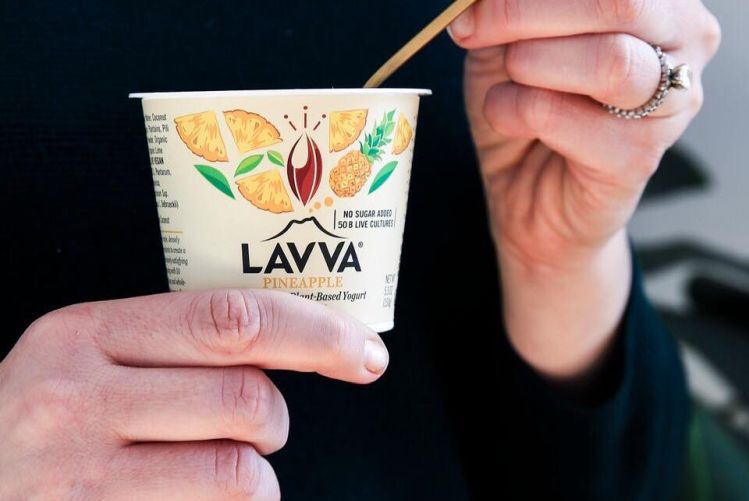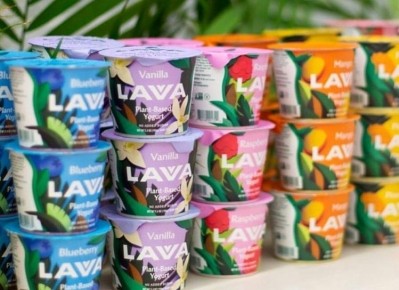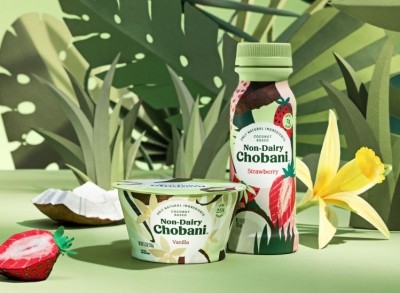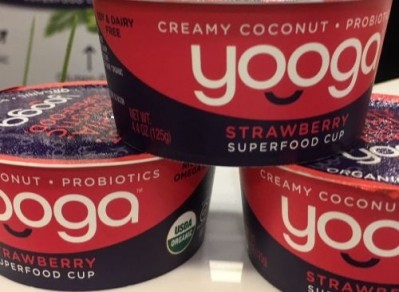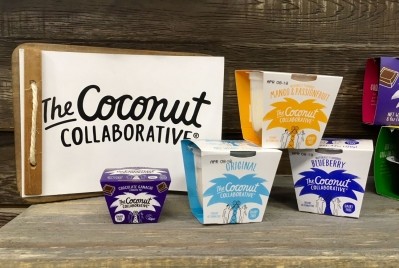Lavva bets big on the pili nut to stand out in the plant-based yogurt category
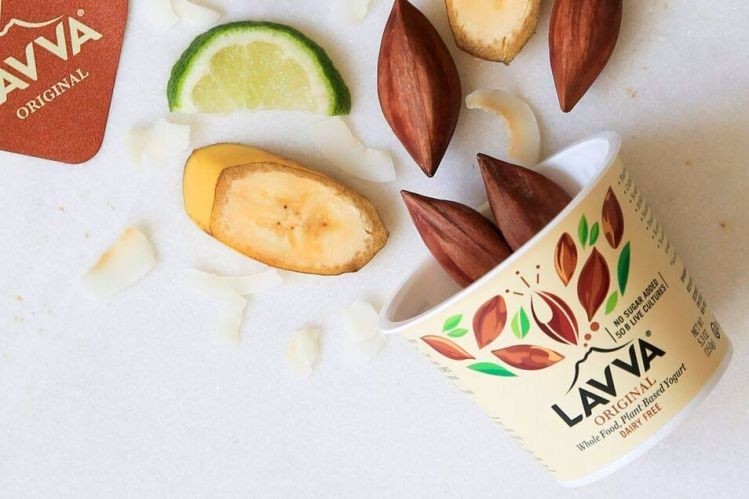
The plant-based yogurt category is notching up strong double-digit growth* – albeit off a small base, but some consumers that are regularly buying plant-based beverages still appear to be wary of similar products in the yogurt aisle, said Nicki Briggs, chief marketing officer at Lavva (owned by New York-based start-up EVR Foods).
“I see so often in the grocery store consumers have a bottle of Silk almondmilk or Califia Farms nut milk in their basket, but they have a dairy yogurt next to it, which tells me they are open to the dairy-free proposition, but the barrier - whether it be taste, texture or nutrition - is still too high in yogurt.”
‘I was really blown away by the taste’
Lavva – developed by Liz Fisher (who has a background in sales at brands including KeVita and Pirate’s Booty), attorney Rebecca Cross, and designer Vivian Rosenthal – recently launched in just under 500 stores in the northeast including Whole Foods, Wegmans, The Fresh Market, Giant and Stop & Shop – and will be expanding on the west coast in the coming months, said Briggs.
Its trademark filing also suggests possible moves into adjacent categories including non-dairy cheese, butter, creamers, toppings, baked good fillings, snacks, and beverages.
“Retailers are seeing a hunger for plant-based products and Lavva is truly differentiated in terms of taste and texture, it’s not just another almond, soy or cashew yogurt. Consumers are looking for a cleaner label, gut health benefits, and lower sugar, and we can deliver on all three.”
Lavva is also one of the few brands in the space that genuinely delivers on taste and texture, claimed Briggs, a dietitian and communications specialist who joined the team last May after being “blown away by the taste.”
“I got involved because I had stopped eating dairy a few years ago, and I’d go and try all these dairy free yogurts, but I was just really disappointed.
“I’m also a dietitian, so I would turn the cup around, and the ingredients lists were so long and there was always a lot of sugar added. Essentially, people are taking plant-based ingredients and then adding a bunch of sugar, gums and stabilizers to make the products edible.”
‘I think oftentimes there can be a fatigue with really thick yogurts for consumers’
Lavva original, by contrast, has a short, clean, ingredients list, with no gums, stabilizers, flavors, added sugars or high intensity sweeteners, said Briggs: Coconut water, organic coconut cream, plantains, pili nuts, organic coconut powder, organic cassava root powder, organic lime juice, Himalayan salt, live vegan probiotic cultures.
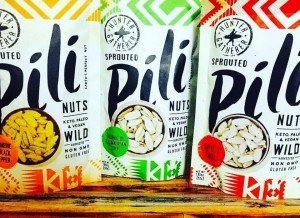
She added: “Lavva spoons like a yogurt – although it’s not quite as thick as a strained yogurt - and it has a really delicious taste but a familiar texture. You are getting creaminess and satiety without it being too loose or too thick, as I think oftentimes there can be a fatigue with really thick yogurts for consumers.”
‘Plant-based, nourishing fats, no added sugar, probiotics and prebiotics… and clean label’
The texture of Lavva is in part due to the inclusion of magnesium-packed pili nuts, which “have a buttery quality, and are high in MCTs [medium chain triglycerides], which are driving the whole bulletproof coffee craze, but have a fairly neutral taste, which makes them a great canvas to innovate on,” added Briggs.
“Instead of adding gums and stabilizers, [co-founder] Liz [Fisher] used young plantains [starchy ‘cooking’ bananas] that are subtlely sweet and also thicken the product, so we can make our products with no added sugar, even in our fruit flavors… To get a fruit prep with no added sugar and no gums and stabilizers has been a real labor of love. The cassava root adds an extra touch of creaminess.
“The plantains also have resistant starch, which serves as a prebiotic, so this gives the probiotics in the product, which have 50bn probiotics at the end of shelf life, something to eat.”
While the pili nuts are obviously a talking point (Lavva is one of the first companies to incorporate them into a packaged food), Briggs said the brand – backed by S2G Ventures and Collaborative Fund – is resonating with consumers on many levels.
“There are so many things to communicate about this brand, but we focus on plant-based, nourishing fats, no added sugar, probiotics and prebiotics… with a clean label. I really think prebiotics are starting to bubble up and I think they are that they are going to be the next wave as people get more familiar with probiotics.”
Plant-based ‘yogurt?’
As for the decision to use the dairy-derived term ‘yogurt’ on pack – a move for which fellow plant-based brand Kite Hill was recently castigated by the National Milk Producers Federation – she said: “This company is built on transparency and being consumer-centric, and was born from an inherent frustration that existed in the category.
“[The phrase] ‘dairy-free’ is squarely next to the product name, and ‘plant-based’ is before the word ‘yogurt,’ so we don’t think there are grounds for confusion.”
As for the issue of nutritional equivalency to dairy – another issue that has generated much debate (and lawsuits) in recent months – Lavva is not trying to mimic dairy yogurt, just to provide another option in the dessert category that is delicious and lower in sugar, claimed Briggs.
Protein: ‘We don’t need 40g of protein in everything we eat…’
While the team at Lavva could have added “processed protein isolates and powders” to up the protein content (currently each cup has 2g protein, whereas dairy yogurts can contain anything from 5-15g), “that would stray from our value proposition of using only unprocessed ingredients, and avoiding anything that negatively impacts taste,” she said.
“We know some consumers would like a bit more protein, but we don’t need 40g of protein in everything that we eat; our goal is to take simple whole foods and use them in creative ways.”
*According to Nielsen data compiled for the Plant Based Foods Association and The Good Food Institute, US retail sales of plant-based yogurts were up 56% in the year to August 12, 2017.
Lavva ingredients (original): Coconut water, organic coconut cream, plantains, pili nuts, organic coconut powder, organic cassava root powder, organic lime juice, Himalayan salt, live vegan probiotic cultures.
Each 5.3oz cup of Lavva (MSRP $2.49/cup) has 140-170 calories, 7g sugar, 2g protein and 11-13g fat, which is higher in fat, but lower in sugar and protein than most dairy yogurts. In the original, the naturally-occurring sugars are primarily from the plantains, plus a "minimal amount" from coconut, says CMO Nicki Briggs.
Lavva is available in five, 5.3-ounce single-serve flavors: Original, Strawberry, Raspberry, Blueberry, and Pineapple.
